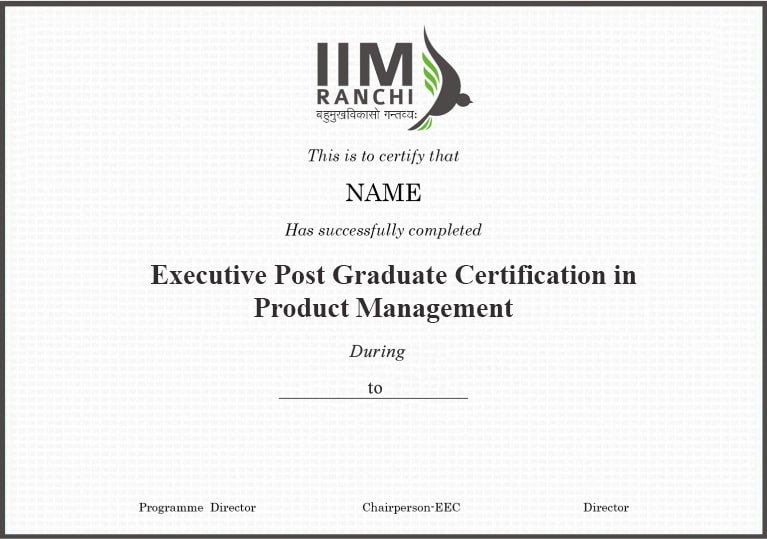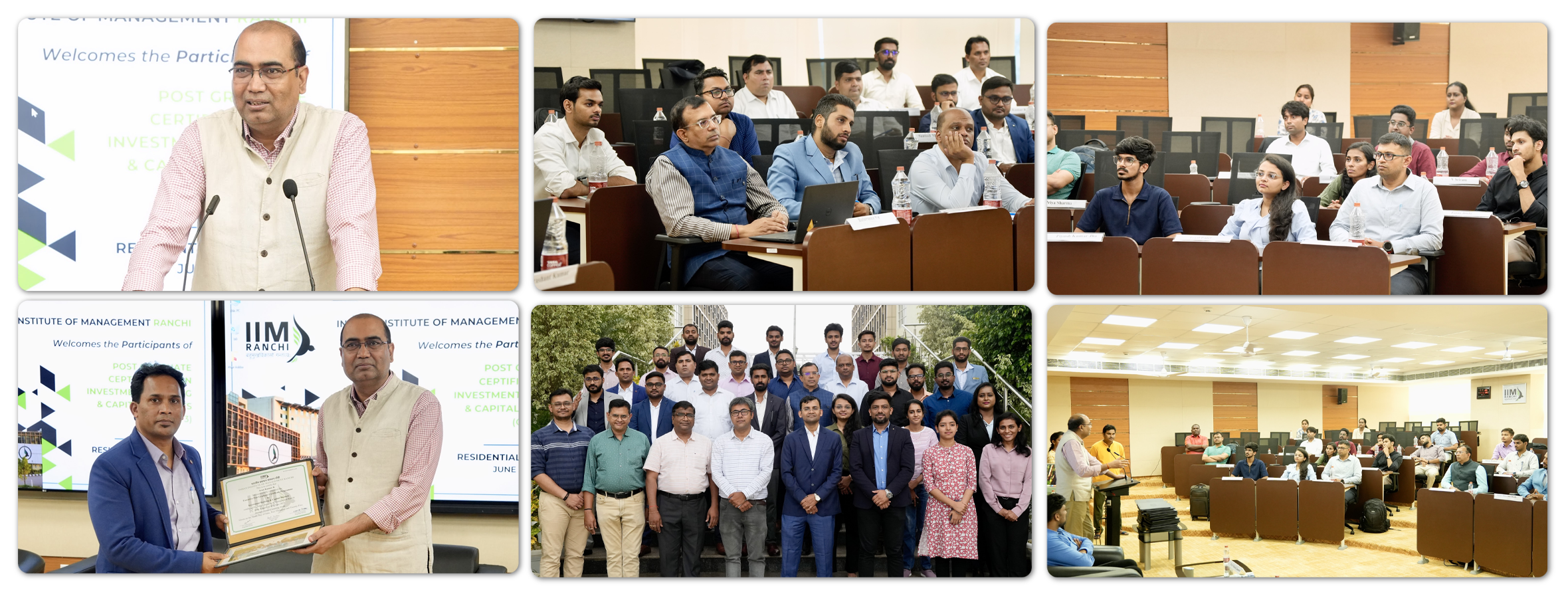Your cart is currently empty.






Product Management Course - IIM Ranchi Programme

Watch
Course PreviewThis course, created in collaboration with IIM Ranchi, will help you become part of the next generation of product management professionals. It covers the product lifecycle, product vision, strategy, research, and more.
In this product management course by IIM Ranchi, you will learn these skills:
MS Excel: Analyze data and create insightful reports using advanced functions and pivot tables.
Figma: Design user interfaces and prototypes for user-centered products.
Jira: Manage agile projects by tracking tasks, backlogs, and sprints efficiently.
Google Analytics: Analyze user behavior to optimize product strategies and improve user experience.
Product Strategy Development: Create effective strategies by understanding market needs and competition.
User Research and Testing: Gather feedback through user interviews and usability testing.
Agile Methodologies: Apply Scrum and Kanban for flexible and collaborative product development.
Here are a few reasons why you should pursue a career in product management:
Opportunity to Drive Impactful Change: Product managers guide product strategy, aligning business objectives with user needs and creating tangible impacts on company success.
Competitive Salary: In India, the average salary of an experienced product manager ranges between INR 20-30 lakh annually, whereas in the US, they earn around $12,00,000 annually.
High Demand and Career Growth: LinkedIn shows more than 18,000 jobs are available in India and more than 1,39,000 in the US.
Access to Various Technology: Work with Excel, and data analytics, staying at the forefront of digital innovation.
A product manager is responsible for guiding a product from idea to launch. They work with marketing, engineering, and design teams to understand customer needs, define product features, and ensure everything aligns with the company’s goals.
There are 25+ courses in this product management program, with multiple real-world case studies and industry-oriented projects.
Course 1: Preparatory sessions on Excel for Data Analytics
Course 2: Introduction to the Project Management tool – Jira
Course 3: Introduction to Figma for UX Design
Course 4: Introduction to Product Strategy & Management
Course 5: Product Life Cycle and Strategy
Course 6: Strategic Market Analysis
Course 7: Product Ideation and Validation
Course 8: Customer-Centric Product Design & Prototyping
Course 9: Competitive Advantage in Product Strategy
Course 10: Product Engineering Strategies
Course 11: Product Launch & Go-To-Market (GTM) Strategies
Course 12: Competitive Strategies and Market Positioning
Course 13: Branding & Product Positioning
Course 14: Product Pricing Strategies
Course 15: Growth Strategies and Competitive Edge
Course 16: Disruptive Innovation & Strategic Planning
Course 17: Product Analytics & its Importance
Course 18: Product Analytics Process
Course 19: Metrics and Goals in Product Analytics
Course 20: Data Cleaning, Coding, and Preparation
Course 21: Descriptive Analytics for Product Management
Course 22: Predictive Analytics for Product Management
Course 23: Analysis for New Product Development
Course 24: Consumer Behavior Analysis
Course 25: Digital Analytics: Tools and Techniques
Course 26: Product Promotion in Digital Space
Course 27: Product Distribution & Support
Course 28: Innovative Communication and Storytelling
Course 29: Strategic Business Case Studies
Talk To Us
We are happy to help you 24/7
55% Average Salary Hike
45 LPA Highest Salary
12000+ Career Transitions
300+ Hiring Partners
Career Transition Handbook
*Past record is no guarantee of future job prospects
Product owners are responsible for maximizing a product’s value by providing insights on how it can be improved.
They manage the entire product development lifecycle, create a product strategy and roadmap, and work with cross-functional teams, such as marketing and business analysts.
They manage the technical aspects of a product. They mainly work with engineering teams and have a strong technical background.
They develop strategies for positioning the product, launching it, and generating market demand. They also conduct customer research and provide insights into the product.
They specialize in improving customer acquisition, user retention, and monetization. Their job is to make strategies to improve customer engagement.
Product Design
Product Planning
Market Research and Strategy
Data Cleaning
Data Analytics
Stakeholder Management
Prototyping
Product Experimentation
Artificial Intelligence
Machine Learning
Usability Testing
Agile Development
Pricing Strategy
User Retention
EMI Starts at
₹5,000
We partnered with financing companies to provide very competitive finance options at 0% interest rate
Financing Partners
![]()
Contact Us
Projects will be a part of your Executive Professional Certification Programme in Product Management to solidify your learning. They ensure you have real-world experience in Product Management.
Engage in an enriching campus immersion experience with IIM Ranchi faculty, right at the IIM Ranchi campus.
Our Alumni work at

This Executive Post Graduate Certification in Product Management course has been designed by top experts with a deep understanding of industry requirements. The course covers various projects and assignments that will assist you in becoming job-ready and taking on challenging roles within the product management industry.
This Executive Post Graduate Certification in Product Management offers in-depth knowledge, hands-on projects, expert insights, and networking opportunities to help you succeed in the product management field.
Executive Post Graduate Certification in Product Management offers a wide range of job opportunities, including:
These roles exist in various industries and companies of all sizes. With the increasing demand for skilled product managers, the field provides promising career prospects and growth potential. There are 17,000+ job opportunities for professionals in India alone and over 1,35,000+ job opportunities in the USA.
The average salary for professionals in product management roles varies based on experience and industry. Generally, entry-level positions start from ₹6,00,000 per annum, while mid-level positions range from ₹10,00,000 to ₹18,00,000 per annum. Senior roles, such as Senior Product Manager or Head of Product, can command salaries upwards of ₹25,00,000 annually.
The course is taught by experienced faculty from IIM Ranchi and industry experts with extensive experience in product management. Practitioners from leading companies also provide insights into real-world challenges and best practices.
Upon successful completion, you will receive an Executive Post Graduate Certification in Product Management from IIM Ranchi, which is recognized and valued in the industry.
Intellipaat provides 24/7 query resolution, allowing you to raise a ticket to the dedicated support team anytime. You can avail of email support for all your queries. If your query is not resolved through email, we can arrange one-on-one sessions with our support team. However, 1:1 session support is provided for 9 months from the start date of your course.
Intellipaat actively offers placement assistance to all learners who have completed the training. For this, we are exclusively tied up with over 300 top MNCs. This way, you can be placed in outstanding organizations such as Sony, Ericsson, TCS, Mu Sigma, Standard Chartered, Cognizant, and Cisco, among other equally great enterprises. We also help you with the job interview and résumé preparation.
Yes, Executive Post Graduate Certification in Product Management is highly valuable. It validates your expertise and knowledge in product management and enhances your credibility in the job market. It demonstrates your commitment to professional growth and can significantly increase your chances of securing rewarding career opportunities.
This Executive Post Graduate Certification in Product Management course introduces various industry-standard tools and platforms used in product management. These may include market research tools like surveys and customer feedback platforms, data analytics software for analyzing product performance and user behavior, project management tools for organizing and tracking tasks, and collaboration platforms for seamless team communication and coordination.
Yes, as per our refund policy, once the enrollment is done no refund is applicable.
Upon completing the course, candidates can apply for executive alumni status by paying Rs. 10,000 + GST directly to IIM Ranchi.










 Click to Zoom
Click to Zoom
